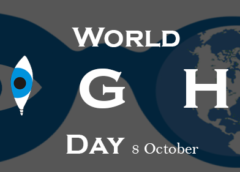On the second Thursday, World Sight Day (WSD) was observed, which means that on 8 October it will take place in 2020. It is observed that the global occurrence draws attention to blindness and poor vision.
The day, celebrated on the second Thursday of October, is an international day of remembrance to focus global attention on blindness and vision disability.
The day was first launched in 2000 by the Lions Club International Foundation’s SightFirstCampaign. WSD is organized under the VISION 2020 Global Plan by the International Agency for the Prevention of Blindness (IAPB).
World Sight Day highlights the value of promoting measures to reduce blindness; since 80% of blindness is preventable (preventable and/or treatable); 4 out of 5 persons have vision disabilities that can be prevented. WSD provides agencies with a voice to help people and communities to undertake diverse prevention initiatives to eradicate preventable blindness and visual disability.
History of World Sight Day
While 2017 is the fifth annual World Sight Day under the VISION 2020 Global Initiative at the direction of WHO and IAPB, the SightFirst Campaign of Lions Club International Foundation (LCIF) originated the event in 1990.
LCIF is a global leader in providing support to help prevent avoidable blindness and restore sight for people living in all parts of the world. LCIF hosts a number of sight programs, including programs that help support the development and improvement of eye care systems, provide resources for sight-restoring surgeries and treatments, and distribute medications to those at highest risk for eye diseases. Through collaborative efforts with their partners, local healthcare authorities, eye care professionals, other non-governmental organizations and Lions, SightFirst have helped at least 30 million people have improved or restored vision.
Why is World Sight Day important for the diabetes community
- Each person with diabetes is at risk of blindness. Any type of eye health condition occurs in about a third of individuals with diabetes, which can have catastrophic and wide-ranging social and economic effects on them, their families, and communities if left untreated.
- 145 million individuals currently have diabetic retinopathy (DR) and 45 million have DR-threatening vision. It is estimated that 224 million individuals will have DR by 2040, and 70 million will have DR-threatening vision.
- With good diabetes prevention, early diagnosis of eye issues with routine eye checks, and prompt care, nearly all vision damage and blindness from diabetes-related eye loss can be avoided.
- Diabetes-related eye protection, though, is mostly missing from conventional primary diabetes care and left to experts in eye hygiene. Combined with financial and geographical obstacles to accessing the appropriate eye health facilities, insufficient knowledge that diabetes can cause vision damage and lifelong blindness means that many people with diabetes do not have sufficient access to critical sight-saving resources.
Purpose
There are a few targets on World Sight Day which they concentrate on every year. Firstly, they want to raise public awareness. It is important to inform the public about blindness and vision disability as an international health issue. Secondly, by World Sight Day engagement and dedicated money, the IAPB requires governments around the world to adopt blindness reduction projects. Finally, they want their target audience to hear about avoiding blindness, sharing the word about the aim of VISION 2020, and gaining awareness for similar events.
All these efforts are tantamount to fulfilling their aim of reducing preventable blindness around the world.
How to celebrate
Here are some ways given:
1. Keep the Day of Donation
Your practice should agree to donate an eye examination fee for a day, or a sum from each frame sold or eye exam given. Optometry organizations may host fundraiser initiatives organized by workers, or encourage employees during October to donate. Simply print out one of these posters or this diagram with a description of the source in your office.
2. Spread awareness through social media
The best chance to write a quick tweet or Facebook post is World Sight Day. Via using the tag # WorldSightDay, join the talk. You will host a friendly contest if your practice is on Instagram. Ask patients, such as the ocean or a family portrait, to share a picture of their favorite sight and tag your practice along with # WorldSightDay. Then, you can pick a winner and award them at a favorite coffee shop or movie theatre with a free $10 gift card.
3. Join the challenge of World Sight Day
Optometry Offering Sight is a national nonprofit that assists programs in underserved areas for sustainable eye treatment. The nonprofit has sponsored 72 vision centers in 38 countries over the years. Optometry Giving Sight is calling for all-optical society participants this month to take part in the World Sight Day Competition. The Challenge is the world’s biggest annual advocacy effort to combat preventable blindness caused by the basic need for an eye test and glasses.

Leave a Reply
You must be logged in to post a comment.